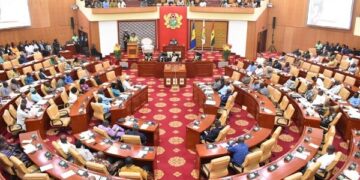Minister for National Security, Mr. Albert Kan-Dapaah, has emphasized the critical need to equip Ghanaians with essential information to combat organized crime and terrorism.
The sub-region, he said, has become the home for many radical and irate terrorists and other criminal actors. This has led many refugees to come to Ghana and highlight the pressing issue of terrorism and violent extremism in West Africa.
Mr Kan-Dapaah was speaking at the launch of the book ‘The Dynamics of Trans-national Organised Crime and Terrorism — An Emerging Security Challenge in West Africa’ authored by Major Dr. Ebenezer Kwakye Agyemang (Rtd) at Kofi Annan International Peace Keeping Training Centre (KAIPTC) in Accra.
He stressed the importance of a collaborative effort between security agencies and the public, emphasizing citizens’ need to understand the characteristics of organised criminal activity.
“Interestingly, you cannot look at a person’s face and tell their intentions; this, therefore, calls for understanding and knowing the characteristics of organised criminal activities and terrorism,” he noted, acknowledging the challenges posed by the evolving nature of crime facilitated by the internet.
Mr. Kan-Dapaah highlighted the diverse security threats faced by Ghana, including unemployment and uncontrolled exploitation of natural resources, both of which impact national survival.
He endorsed the Ministry’s “See Something, Say Something” campaign, which aims to sensitize the public on personal security, acknowledging its increased significance in the face of security challenges in neighbouring West African countries.
“As a country, we should consider the critical economic, political, and social measures needed to assist in the fight against organised crime and terrorism,” he stressed and encouraged collective efforts to combat these threats.
The launch event, held at the Kofi Annan International Peace Keeping Training Centre (KAIPTC) in Accra, saw a diverse audience, including members of the security service, coming together to address the urgent need for vigilance against organised crime and terrorism.




















































































